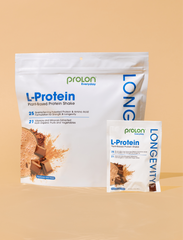
The Gut’s Role in Healthy Aging and Longevity
Guest Author: Melanie Murphy Richter, MS, RDN
As we navigate the intricate journey of aging, there's one often overlooked aspect of our health that plays a crucial role in how we age: our gut. Far beyond its primary function of digesting and absorbing food, the gut is an integral component in the proper functioning of our health and immune system, significantly influencing our healthspan and longevity.
As a gut health Dietitian, I intimately know that the human gut is not just a single organ; it's a complex system responsible for several vital functions. It all begins with digestion—starting in the mouth, continuing through the stomach, and into the intestines, where enzymes break down food into essential nutrients that our body needs to fuel energy, repair, regulate the production of neurotransmitters, etc. These nutrients are absorbed into the bloodstream through the small intestine, supplying the body with the vitamins, minerals, and compounds it needs to thrive. But digestion is only part of the story. Inside the gut lives a vibrant community of trillions of microorganisms, each playing a critical role in synthesizing vitamins, aiding digestion, and defending against harmful bacteria.
How the Gut Supports Healthy Aging
As we age, the efficiency of our digestive system and the composition of our gut microbiome can change, impacting how well we absorb nutrients, how well we produce certain enzymes that impact nutrient breakdown, and maintain overall health. A healthy gut supports aging in several ways: efficient digestion and nutrient absorption help preserve muscle mass, bone density, and cognitive function. Additionally, a balanced gut microbiome strengthens immune function and can help lower the risk of gastrointestinal issues, which become more common as we age. Studies have found that age-related changes in the gut microbiota are linked to increased risks of chronic diseases including type 2 diabetes, obesity, Alzheimer’s disease, depression, anxiety, and more. Maintaining a diverse and healthy microbiome can, therefore, promote a more graceful and healthy aging process.
The Science of Cellular Rejuvenation
One of the most exciting areas in longevity research is the concept of cellular rejuvenation. This process is the body's remarkable ability to repair and regenerate cells, essential for supporting tissue and organ function over time. Central to this is autophagy, a natural mechanism where the body cleans out damaged cells and regenerates new ones, essentially allowing our cells to function more efficiently. Autophagy may be a helpful component in maintaining the integrity of the gut lining, and creating a supportive environment for healthy gut bacteria. Research suggests that practices such as intermittent fasting and specific diets like the Fasting Mimicking Diet (FMD) might be able to support this natural process, potentially enhancing gut health over time.
What About the Fasting Mimicking Diet?
The Fasting Mimicking Diet (FMD) offers a unique approach to longevity by providing the benefits of fasting while still allowing some nutrient intake. This innovative program supports cellular rejuvenation, which may translate to gut function. Some preclinical research has positively linked the FMD to a more balanced and diverse microbial environment in mice models. More in depth clinical research in humans is currently in development, hopefully adding more color and insight into the effects of FMD on conditions like Irritable Bowel Disease (IBD), for instance.
Enhancing the Gut-Brain Connection with FMD
Recent breakthroughs in research have revealed the powerful connection between the gut and the brain, known as the gut-brain axis. This bidirectional communication network demonstrates how gut health and mental well-being are deeply interconnected, influencing our emotions, cognitive function, and overall mental health. Incorporating periodic cycles of the FMD may offer a way to support cognitive health through this gut-brain communication.
The gut-brain axis operates through complex interactions between the gut microbiome and the brain, mediated by biochemical signaling pathways and the nervous system. This communication system allows the gut to send signals to the brain about hunger, mood, and stress, while the brain can influence gut function through emotional and psychological states. For instance, chronic stress can disrupt this balance, leading to negative impacts on both gut health and cognitive function.
Fasting, particularly through the FMD, presents a promising approach that may have the potential to support this gut-brain communication and cognitive health. The 5-day program has been linked to immune cell activation, supporting a healthy immune system, the growth of beneficial gut bacteria like Lactobacillus and Bifidobacterium families, and improved gut barrier function through nutrients like DHA, for instance—each contributing to better brain health and cognitive performance.
Here’s how fasting supports the gut-brain axis and cognitive health:
- The gut microbiome interacts with the brain by producing neurotransmitters and modulating the immune system. A healthy microbiome can boost cognitive function by producing brain-supporting compounds.
- Periodic fasting through FMD may be able to shift the gut microbiota toward a healthier balance, enhancing gut health and, in turn, cognitive function.
- Periodic use of the FMD may lower levels of stress hormones like cortisol over time. Reduced stress levels can improve mood, alleviate anxiety, and support cognitive function also.
- Studies suggest that fasting activates cellular repair processes and promotes neurogenesis, the formation of new neurons, essential for maintaining cognitive health and mental clarity.
Embracing Gut Health for a Long and Healthy Life
The gut is a central player in our health, especially as we age. By understanding its mechanisms and supporting gut health through cellular rejuvenation and balanced diets, we may be able to significantly enhance our well-being and longevity. The research into gut health and its connection to aging is evolving rapidly, offering new insights into how we can live longer, healthier lives.













